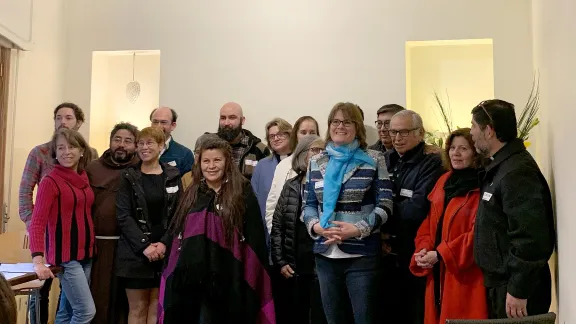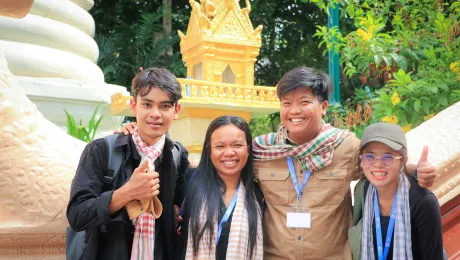
Signatories of a new Spiritual Alliance for the Climate gather in Santiago, Chile on 21 July. Photo: Monserrat Madariaga/Lutheran Church in Chile
Ecumenical and interfaith networks plan non-stop shared celebration, reflection and advocacy during COP25
(LWI) - Christians and Muslims, Buddhists and Bahais, members of indigenous and interfaith organizations have come together in Chile to form a ‘spiritual alliance’ ahead of the COP25 conference which will take place in the capital, Santiago, in December.
More than 20 religious, ecumenical and interreligious networks met together on 21 July to sign an agreement showing their common commitment to care for the Earth and to promote ‘systematic, cultural and spiritual change’ to tackle the climate crisis.
Among those present for the signing of the Interreligous and Spiritual Alliance for the Climate Compact were Rev. Izani Bruch, Bishop of the Evangelical Lutheran Church in Chile (IELCH) and Felípe Sepúlveda of the Lutheran Church in Chile (ILCH). The agreement says that “the inequalities and injustices generated or worsened by the environmental crisis challenge” all people of faith to work for transformation, based on the religious and spiritual traditions of each church or community.
Shared space of encounter and worship
Signatories pledged to organize a shared “space of encounter” or tent where the different communities can host worship, meditation, celebrations and other related activities, before and during the UN’s COP25 summit from 2-13 December. There will also be an interfaith preparatory vigil on 1 September, the World Day of Prayer for the Care of Creation.
Members of the alliance committed to making available financial and material resources to develop their goals and said they would welcome other organizations wanting to join the initiative.
Climate justice is a priority for the Lutheran World Federation (LWF) and young people have been representing the global Communion at the UN Climate talks since 2011. LWF’s Youth Secretary Pranita Biswasi will be part of the LWF delegation to COP25 in Santiago. She welcomed the news of the new interfaith alliance, noting that “the disasters caused by climate change are affecting all human kind, regardless of our faith.” They are “challenging us to find new ways of working together to protect our common home within the different national and regional contexts where our communities are living and working,” she said.
Faith-based groups share an urgent responsibility to bring the voice of vulnerable people, most affected by climate change, to the decision makers, she said, adding: “We look forward to supporting the activities of this interfaith initiative over the coming months.”


